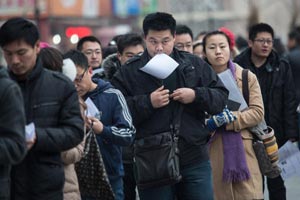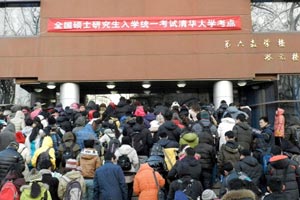Shandong province sends about 50,000 workers overseas a year, although most are unskilled workers taking jobs in construction, farming and deforestation projects, said Zhang Peng, deputy director of the division of economic cooperation under the province's commerce department.
He said it has become more difficult to recruit migrant workers for overseas markets, as the pay disparity between home and abroad for manual work is disappearing.
"Japan is the top destination for our province's labor force, but the annual income for a Chinese migrant worker nowadays is not that different from the amount there 20 years ago. Plus, the Japanese yen has been depreciating," Zhang said.
Labor-intensive industries in developed countries are also turning to much cheaper labor in Southeast Asia and South Asia.
"We realize it's urgent to upgrade our labor strategy," Zhang said.
"It's a win-win situation to encourage college graduates to work overseas, as it can relieve the domestic employment pressure and many students are happy to have overseas work experience, considering it an important way to broaden their horizons and become more competitive," Zhang said.
The Shandong government started to encourage college students to seek jobs overseas in 2010, said Li Liang, director of the service center for Shandong College Graduates' Employment Information.
As of 2013, about 3,000 students who graduated from colleges in Shandong have been sent abroad for work, according to the service center.
"Singapore, Japan and the Middle East recruit the most graduates from Shandong," Li said. "The annual income for most is about two to five times that of their counterparts in China."
Chinese language teachers, nurses, engineers and technicians, sales and administrative staff members in the tourism and retail industries are the most-wanted skills in developed economies, said Zong Qiuhong, who is in charge of overseas employment for Changchun Talent International, a recruitment agency in Jilin province.
Chinese people's increasing enthusiasm for travel abroad and splurging on luxurious items have made overseas employers from the retail and tourism industries desperate to hire bilingual talent, especially native Chinese speakers, she said.
In Singapore, she explained, the brain drain of domestic talent and the aging population creates numerous job opportunities for Chinese graduates. Given its large Chinese community and favorable immigration policies, Singapore is often the first choice for many job seekers.
The commerce authorities in Jilin invited dozens of licensed recruitment agencies with about 3,400 vacancies to a job fair dedicated to college graduates in Changchun in late November.
Although about 300 students left contact information at the exhibition, only a third finally sent their resumes for application, said Gu Hongming, director of Jilin's overseas employment administration.
Zhang with Shandong's commerce department said factors including safety in a foreign country and service charges for recruitment agencies also scare some students away.
Lin Yanling, a professor of labor studies at the China Institute of Industrial Relations, said employment options overseas will always be limited for Chinese graduates, as most countries prioritize offering jobs for their nationals.
"However, global labor is becoming less restrained by borders, so it's important for our students and universities to diversify employment channels," she said.
Han Junhong in Changchun and Qi Xin in Zhengzhou contributed to this story.
|
Related coverage: |
||
|
 |
 |
 |
|
|
|
|
|
|
|
|